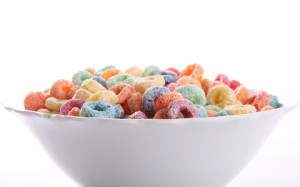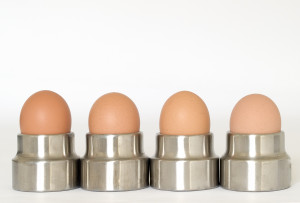 Breakfast is said to be the most important meal of the day, but one survey found only 34 percent of U.S. adults take the time to eat a morning meal.[i]
Breakfast is said to be the most important meal of the day, but one survey found only 34 percent of U.S. adults take the time to eat a morning meal.[i]
Whether or not eating breakfast is truly beneficial, as opposed to skipping it, is up for debate – there’s evidence both for and against it.
But assuming you choose to eat breakfast, there’s no doubt that what you choose to eat for said meal will make or break its value. In the US, many of the most popular breakfast foods are also among the worst choices for your health. If you’re eating any of the unhealthy breakfasts that follow, you might be better off eating no breakfast at all (or choosing from the healthy breakfast options at the end of this article).
5. Fast-Food Breakfast Sandwiches
Most people will quickly call out these sandwiches for their high levels of calories, fat and sodium. But to me, the most compelling reason to avoid them of all is their very artificial and synthetic ingredients. Like most fast food, these represent the epitome of industrial food – meat and eggs from concentrated animal feeding operations (CAFOs), genetically modified ingredients, artificial flavors, synthetic flavor enhancers, partially hydrogenated oils, and cheap fillers.
The Sausage, Egg & Cheese Mcgriddle at McDonald’s, for example, might not sound too bad on the surface, but look at the ingredients and you’ll find (this is just a brief sampling of the lengthy list):[ii]
- Flavor enhancer, modified food starch and soybean oil in the egg
- Artificial flavors, soybean oil and potentially toxic caramel color in the griddle cakes
- The toxic preservative BHA in the sausage patty (along with corn syrup solids)
4. Cereal
Cold cereal is the most common breakfast food in the US,[iii] but most cereal is very high in sugar. Some of the most popular cereals are more than 50 percent sugar, by weight, and easily contain more sugar than a Twinkie or three chocolate chip cookies.[iv]
Even ‘healthy’ cereals, like Kashi GOLEAN, contain about 26 grams of sugar when combined with one cup of milk. That’s equal to six teaspoons of sugar[v] — which is the upper amount of sugar the World Health Organization recommends eating in an entire day.[vi]
One study even found that eating a high-protein breakfast (i.e. eggs) lead to “beneficial alterations in the appetitive, hormonal, and neural signals that control food intake regulation” more so than eating a cereal-based breakfast.[vii]
3. Bagels
By now you’re probably all-too-familiar with the risks of eating refined carbohydrates – all of which apply, in spades, to bagels. With virtually no fiber or protein to speak of, a bagel is almost all carbs … a lot of them. Eating one six-inch bagel is like eating more than four slices of bread in terms of carbs, which are then broken down into sugar in your body. As SF Gate reported:[viii]
“A typical bagel therefore becomes the equivalent of over 16 teaspoons of sugar in your blood, which is approximately the same as a can and a half of regular soda.”
Note that virtually every other flour-based breakfast item also falls into this refined carb “don’t eat” category, including pancakes, waffles, muffins and pastries.
2. “Smoothie-Place” Smoothies
Smoothies can be healthy, but if you get one from a “smoothie place” it’s probably not. At Jamba Juice, for instance, a seemingly healthy Kale-ribbean Breeze (I mean, it has kale in the name) contains 85 grams of sugar in the 28-ounce size (that’s 21 teaspoons – about 15 more than you should be eating all day).
1. Yogurt
Think yogurt is healthy? If you’re eating popular brands like Yoplait, Dannon or even Chobani Greek yogurt – drop your spoon. A recent report by the Cornucopia called most yogurt on store shelves out for what it really is: junk food:[ix]
“Conventional yogurt of today is produced with milk from cows that are nearly always confined and unable to graze on pasture, and fed genetically engineered grains. Chemical defoamers, banned in organics, are commonly added to milk during the processing of lowfat yogurt.
Add in artificial sweeteners or high doses of sugar and high fructose corn syrup, artificial colors, synthetic preservatives, and the gut-wrenching thickener carrageenan, and it’s plain to see that many yogurt products are essentially junk food masquerading as health food.”
So What’s Left to Eat?
Plenty! If you’re looking for a healthy breakfast that will fill you up (not out) and keep you going strong all morning, choose from the options below. In a nutshell, you want foods that are low in sugar and refined carbohydrates, high in protein and rich in fiber, vitamins, minerals and antioxidants. And you want whole foods, not processed simulations.
Homemade Breakfast Sandwiches (or Just the Eggs)
 Cook two organic free-range eggs in your favorite style. Put them on one slice of whole-grain bread. Add organic cheese if you like and then boost the nutrition even more by adding sliced avocado, tomato, sautéed onion or green pepper and a small handful of steamed spinach.
Cook two organic free-range eggs in your favorite style. Put them on one slice of whole-grain bread. Add organic cheese if you like and then boost the nutrition even more by adding sliced avocado, tomato, sautéed onion or green pepper and a small handful of steamed spinach.
Part of what makes this such a great choice is the eggs (so feel free to feast on just the eggs, if you prefer). As an excellent source of both protein and fat, eggs will leave you feeling satisfied longer than a bagel or bowl of cereal ever could. Plus, they contain B vitamins like choline for your heart and brain (and reduced levels of inflammation) and naturally occurring antioxidants that benefit your eyes.
If you’re worried about your cholesterol, don’t be. The latest research has shown that eggs do not significantly impact cholesterol levels, and may, in fact, improve your cholesterol profile. Plus, one study found that, compared to those who eat bagels, people who eat two eggs for breakfast lose 65 percent more weight and have higher energy levels.[x]
Organic Nut Butter
Peanut butter or almond butter can give you a quick protein boost to give you energy and keep you satisfied. A couple of tips: try spreading your nut butter on apple or banana slices or a stalk of celery instead of bread, or add a tablespoon to a homemade smoothie (see below). Be sure to choose a natural brand with just nuts (not added vegetable oils or sugar), and go organic, as peanuts tend to be a heavily pesticide-sprayed crop.
Homemade Smoothies
Grab some organic milk, organic plain yogurt, berries (frozen work well) and a banana and you’ve got the makings of a healthy smoothie. Add in some chia seeds for fiber and omega-3 fats, a large handful of raw spinach and half an avocado (you won’t even notice it) to kick up the nutrition level even more.
For something different, make your smoothie out of kefir, a yogurt-like beverage made from fermented milk, Kefir is loaded with beneficial enzymes and bacteria that aid digestion and boost your immune system. A natural energy booster, kefir can easily replace coffee or tea in the morning, and will provide your body with vitamins and minerals instead of simply caffeine. Just be sure to make your own kefir (most sweetened varieties at the store have the same issues as conventional yogurt).
Oatmeal
If you’re a cereal fan, try swapping it out for oatmeal. Oats contain anti-inflammatory substances, antioxidants and nutrients, including zinc, biotin, magnesium, chromium, phosphorus and manganese. It’s also a phenomenal source of fiber, and research shows eating oatmeal improves appetite control and increases satiety compared to breakfast cereal.[xi]
Be sure to opt for the plain oats (not the instant sweetened varieties) and add your own ‘toppings’ at home. Cinnamon, raisins and bananas work well, but you can even opt for a savory flavor instead by adding shredded cheese, hot sauce and veggies.
Healthy Leftovers
Leftovers make great breakfast. Cold pizza has even been described as an “all-time favorite” breakfast in America[xii] – but that’s not the kind of leftovers I’m referring to! If you made a veggie stir fry or batch of chicken soup, why not enjoy it for breakfast too? This might take some getting used to … but just like you can eat ‘breakfast food’ for dinner, you can eat ‘dinner food’ for breakfast too.
Now DO NOT Miss… the Fastest & Most Effective Way to Curb Your Cravings and Burn Unwanted Fat…
[i] Kellogg’s Breakfast in America
[iv] Environmental Working Group December 2011
[vii] Am J Clin Nutr. 2013 Apr;97(4):677-88.
[ix] The Cornucopia Institute Culture Wars
[x] Int J Obes (Lond). 2008 Oct;32(10):1545-51.



Very informed good read